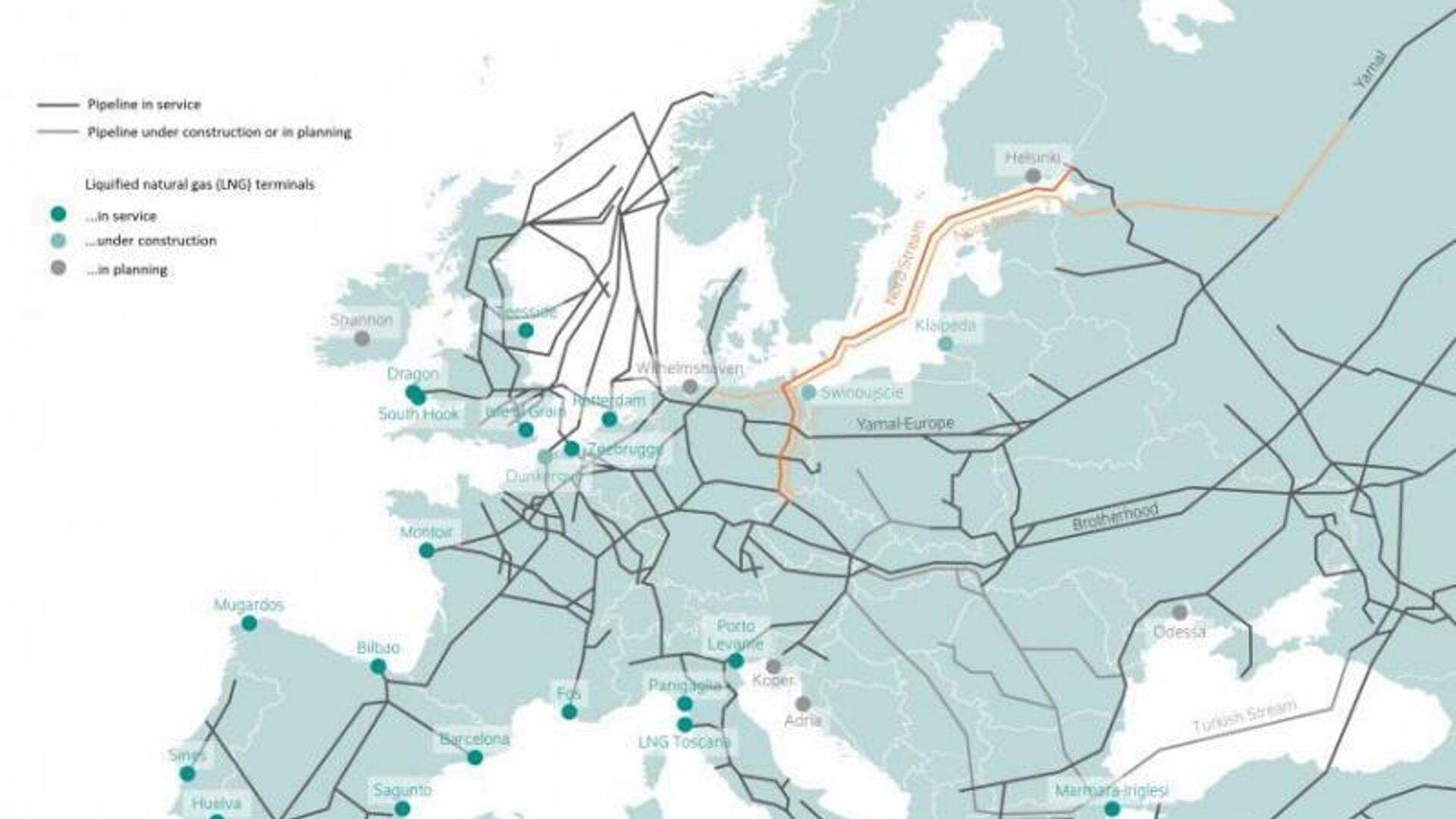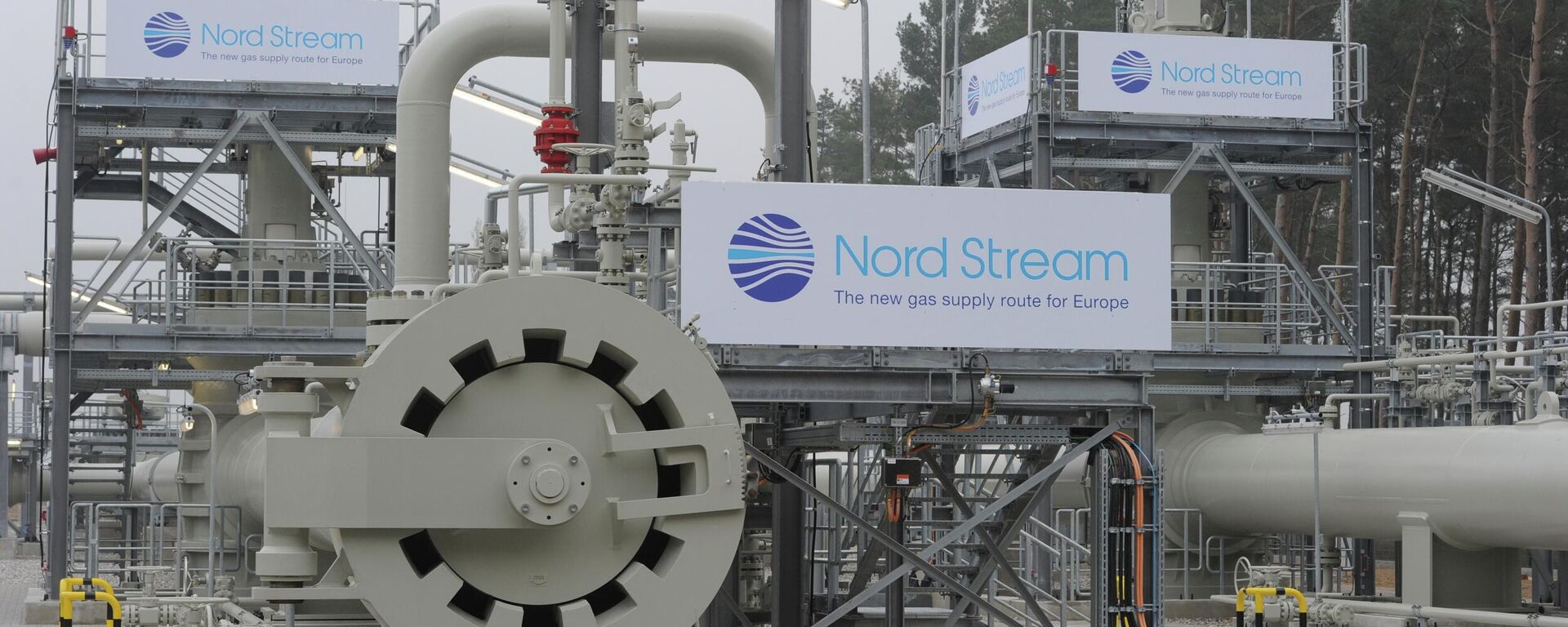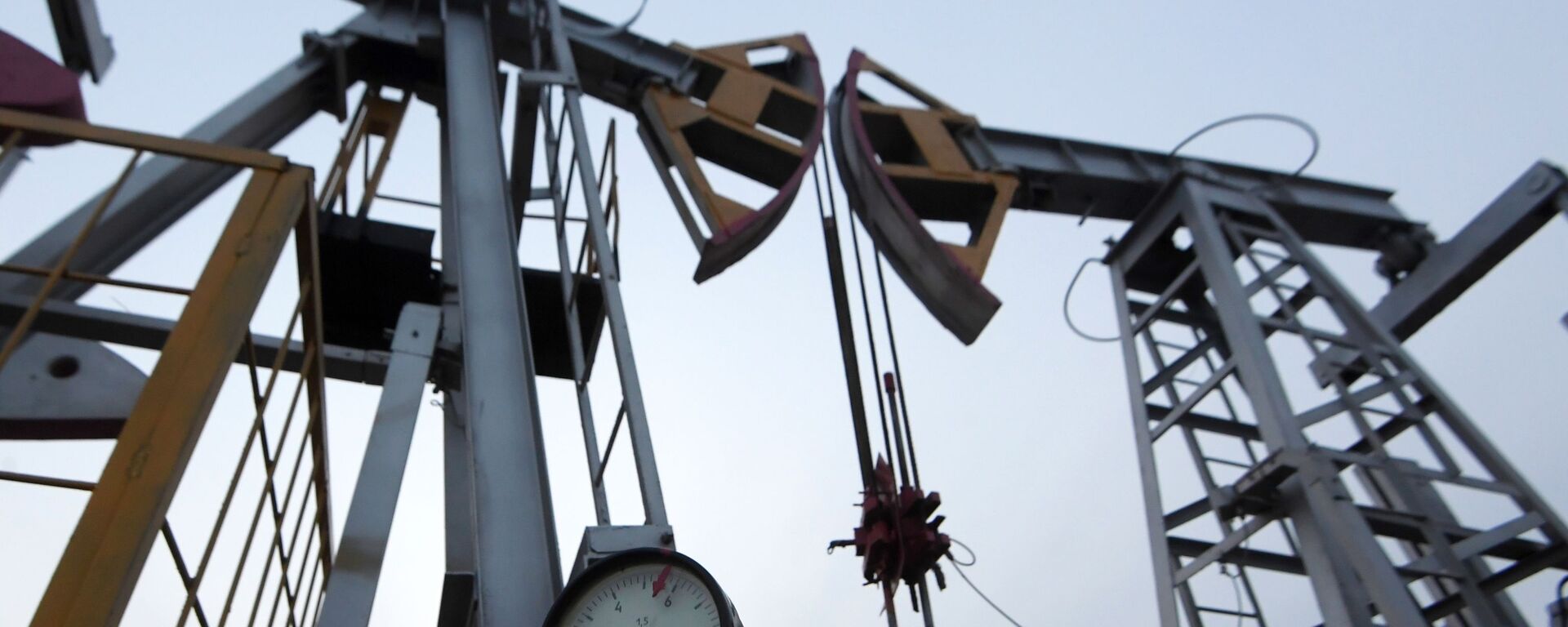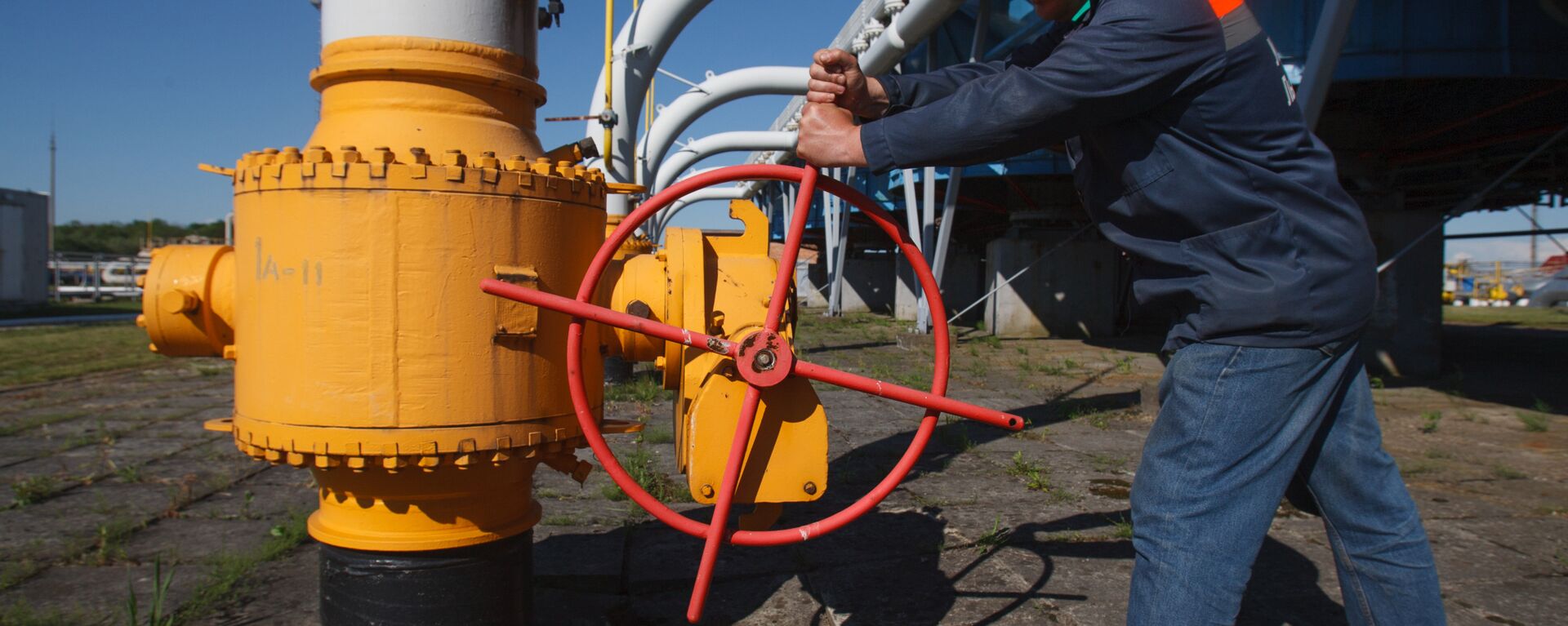https://sputnikglobe.com/20220721/all-technical-difficulties-surrounding-supply-of-russian-gas-stem-from-western-restrictions-kremlin-1097649391.html
Kremlin Says Western Restrictions to Blame for Technical Problems With Russian Gas Deliveries
Kremlin Says Western Restrictions to Blame for Technical Problems With Russian Gas Deliveries
Sputnik International
Russian gas deliveries via the Nord Stream 1 pipeline were resumed on Thursday morning following scheduled maintenance work. Last month, Gazprom was forced to... 21.07.2022, Sputnik International
2022-07-21T09:56+0000
2022-07-21T09:56+0000
2022-11-03T19:04+0000
gas
vladimir putin
gazprom
europe
energy
crisis
energy crisis in europe
dmitry peskov
https://cdn1.img.sputnikglobe.com/img/07e5/0a/06/1089711317_0:100:800:550_1920x0_80_0_0_ac635fc3c5e90478b59272b50350b66c.jpg
All technical problems related to the delivery of Russian gas to Europe are the result of various restrictions Western countries themselves have placed on Russian energy exports, Kremlin spokesman Dmitry Peskov has indicated."I suggest that you carefully reread the statement made by the [Russian] president in Tehran. He explained in great detail how many compressor stations there are, what kinds of problems have been recorded by Siemens - and in connection with this, what type of situation is occurring where it is impossible to build pressure up to 100 percent. These are technical reasons connected to the impossibility of proper technical maintenance," Peskov said, speaking to reporters on Thursday.Peskov indicated that Gazprom remains committed to fulfilling its obligations in full, and rejected recent statements made by Western officials and media about alleged Russian attempts to "pressure or blackmail" Europe in the energy sector. "These are absolutely false statements and we categorically deny them," he said.Nord Stream 1, which has become Gazprom's central gas supply route to Europe amid machinations by Poland and Ukraine, resumed operations on Thursday morning following scheduled summer maintenance work, and is now expected to resume operations at about 40 percent of its capacity of 55 billion cubic meters of gas per year. Gazprom was forced to reduce shipments via the network in mid-June over delays in the repair of a Siemens-built high-pressure gas pumping turbine in Canada. Ottawa deliberately delayed the return of the turbine, which had undergone maintenance work, back to Europe, citing anti-Russian sanctions. Last week, amid pressure from Germany, Ottawa relented, with the turbine now thought to be on route back to Europe for installation at Gazprom's Portovaya Compression Station on the Russian Baltic Sea coast. Ukrainian authorities blasted Canada over the move, vowing that Kiev would "never accept" Ottawa's decision.Europe Shoots Self in FootPresident Putin commented on the European energy crisis in remarks to reporters at the conclusion of his working visit to Iran on Tuesday, indicating that the EU and its allies in Kiev are wholly responsible for current situation regarding gas deliveries from Russia."Until recently, we supplied...around 30 billion cubic meters [of gas] a year to Turkey, and 170 billion to Europe, 55 billion of that via Nord Stream 1, and, if memory serves, 33 billion via Yamal-Europe, through two strings running through Ukraine. And about 12 billion to Europe through Turkey via Turkstream," Putin said.After that, Putin said, Poland imposed sanctions on the Soviet-era Yamal-Europe network, first shutting it down and then turning it back on in reverse mode to send about 32 million cubic meters of gas per day from Germany eastward. "So, first one of the routes in Ukraine was shut down, then Yamal-Europe was shut down; now Nord Stream 1, which is one of the main routes - we pump 55 billion cubic meters a year through it," Putin said.The Russian president noted that there are five Siemens-built gas compressor turbines used by Nord Stream 1, plus one more on standby. One turbine was sent out for repairs to a Siemens plant in Canada, but was slapped with sanctions by Ottawa. On top of that, another turbine at Portovaya is out of order due to technical problems, leaving two operational units currently pumping 60 million cubic meters of gas per day.The Russian president added that the new Nord Stream 2 pipeline network, which could double the Nord Stream network's capacity to 110 billion cubic meters of gas per year over the long term, remains ready for launch, but has been frozen by Germany.European economies are bracing for a cold winter and rushing to fill up underground gas storage facilities amid the largely self-inflicted energy crisis brought on by sanctions and Brussels' push to "phase out" or restrict purchases of Russian oil, gas and coal to "punish" Moscow over its military operation in Ukraine. This week, the International Monetary Fund predicted that some countries' economic output could fall up to 6 percent in the event of a total shutoff of Russian gas. Business leaders in Germany, the EU's main industrial powerhouse, have warned that the country could face its gravest economic crisis since the Second World War amid the tensions over Russian gas deliveries.
https://sputnikglobe.com/20220721/nord-stream-ag-resumes-gas-deliveries-to-eu-after-maintenance-works-1097646970.html
https://sputnikglobe.com/20220721/uk-to-impose-new-sanctions-on-coal-and-oil-imports-from-russia-1097641462.html
https://sputnikglobe.com/20220720/european-commission-suggests-member-states-cut-gas-consumption-by-15-as-bloc-braces-for-winter-1097629696.html
Sputnik International
feedback@sputniknews.com
+74956456601
MIA „Rosiya Segodnya“
2022
News
en_EN
Sputnik International
feedback@sputniknews.com
+74956456601
MIA „Rosiya Segodnya“
Sputnik International
feedback@sputniknews.com
+74956456601
MIA „Rosiya Segodnya“
gas, vladimir putin, gazprom, europe, energy, crisis, dmitry peskov
gas, vladimir putin, gazprom, europe, energy, crisis, dmitry peskov
Kremlin Says Western Restrictions to Blame for Technical Problems With Russian Gas Deliveries
09:56 GMT 21.07.2022 (Updated: 19:04 GMT 03.11.2022) Russian gas deliveries via the Nord Stream 1 pipeline were resumed on Thursday morning following scheduled maintenance work. Last month, Gazprom was forced to cut supplies sent through the network to about 40 percent of capacity due a refusal by Canada to send a Siemens turbine used by Nord Stream 1 to Russia due to sanctions.
All technical problems related to the delivery of Russian gas to Europe are the result of various restrictions Western countries themselves have placed on Russian energy exports, Kremlin spokesman Dmitry Peskov has indicated.
"I suggest that you carefully reread the
statement made by the [Russian] president in Tehran. He explained in great detail how many compressor stations there are, what kinds of problems have been recorded by Siemens - and in connection with this, what type of situation is occurring where it is impossible to build pressure up to 100 percent. These are technical reasons connected to the impossibility of proper technical maintenance," Peskov said, speaking to reporters on Thursday.
"Any technical difficulties associated with this stem from the restrictions that European states and the European Union themselves have introduced...It is these restrictions which do not allow for the repair of equipment, including turbines operating at compressor stations. And it is these restrictions which lead to the fact that some units cannot currently receive the necessary maintenance," he stressed.
Peskov indicated that Gazprom remains committed to fulfilling its obligations in full, and rejected recent statements made by Western officials and media about alleged Russian attempts to "pressure or blackmail" Europe in the energy sector. "These are absolutely false statements and we categorically deny them," he said.
Asked to comment on Wednesday's remarks by State Department spokesman Ned Price that the resumption of Nord Stream 1's operation would be "an important element" in ensuring Europe's security, Peskov said Moscow was "no longer surprised" by anything Washington says. "As for the energy security factor, yes, we agree - we constantly say that Russia, as a supplier of energy resources, is very important and integral factor for European energy security. This is true," he said.
Nord Stream 1, which has become Gazprom's central gas supply route to Europe amid machinations by Poland and Ukraine, resumed operations on Thursday morning following scheduled summer maintenance work, and is now expected to resume operations at about 40 percent of its capacity of 55 billion cubic meters of gas per year. Gazprom was forced to reduce shipments via the network in mid-June over delays in the repair of a Siemens-built high-pressure gas pumping turbine in Canada. Ottawa deliberately delayed the return of the turbine, which had undergone maintenance work, back to Europe, citing anti-Russian sanctions. Last week, amid pressure from Germany, Ottawa relented, with the turbine now thought to be on route back to Europe for installation at Gazprom's Portovaya Compression Station on the Russian Baltic Sea coast. Ukrainian authorities blasted Canada over the move, vowing that Kiev would "never accept" Ottawa's decision.
Europe Shoots Self in Foot
President Putin commented on the European energy crisis in remarks to reporters at the conclusion of his working visit to Iran on Tuesday, indicating that the EU and its allies in Kiev are wholly responsible for current situation regarding gas deliveries from Russia.
"Until recently, we supplied...around 30 billion cubic meters [of gas] a year to Turkey, and 170 billion to Europe, 55 billion of that via Nord Stream 1, and, if memory serves, 33 billion via Yamal-Europe, through two strings running through Ukraine. And about 12 billion to Europe through Turkey via Turkstream," Putin said.
"Ukraine suddenly announced that it was going to close one of the two routes on its territory, allegedly because the gas pumping station is not under its control but on the territory of the Lugansk People's Republic. It found itself under the control of the LPR several months earlier, but they closed it just recently without any grounds," he said.
After that, Putin said, Poland imposed sanctions on the Soviet-era Yamal-Europe network, first shutting it down and then turning it back on in reverse mode to send about 32 million cubic meters of gas per day from Germany eastward.
"Where is the gas from Germany coming from? It is our Russian gas. Why from Germany? Because it turned out to be cheaper for the Poles. They used to get it from us at a very high price, closer to the market price, whereas Germany gets it from us 3-4 times cheaper than the market price under long-term contracts," he explained.
"So, first one of the routes in Ukraine was shut down, then Yamal-Europe was shut down; now Nord Stream 1, which is one of the main routes - we pump 55 billion cubic meters a year through it," Putin said.
The Russian president noted that there are five Siemens-built gas compressor turbines used by Nord Stream 1, plus one more on standby. One turbine was sent out for repairs to a Siemens plant in Canada, but was slapped with sanctions by Ottawa. On top of that, another turbine at Portovaya is out of order due to technical problems, leaving two operational units currently pumping 60 million cubic meters of gas per day.
"So, if one more is delivered, fine, we will have two in operation. But if it is not, only one will be left, and it will pump only 30 million cubic meters per day. You can imagine how much time it will take to pump the rest. How is this Gazprom's responsibility? What does Gazprom even have to do with this? [The West] cut off one route, then another, and sanctioned this gas pumping equipment. Gazprom is ready to pump as much gas as necessary. But they have shut everything down," Putin stressed.
The Russian president added that the new Nord Stream 2 pipeline network, which could double the Nord Stream network's capacity to 110 billion cubic meters of gas per year over the long term, remains ready for launch, but has been frozen by Germany.
European economies are bracing for a cold winter and rushing to fill up underground gas storage facilities amid the largely self-inflicted energy crisis brought on by sanctions and Brussels' push to "phase out" or restrict purchases of Russian oil, gas and coal to "punish" Moscow over its military operation in Ukraine. This week, the International Monetary Fund predicted that some countries' economic output could fall up to
6 percent in the event of a total shutoff of Russian gas. Business leaders in Germany, the EU's main industrial powerhouse, have
warned that the country could face its gravest economic crisis since the Second World War amid the tensions over Russian gas deliveries.







